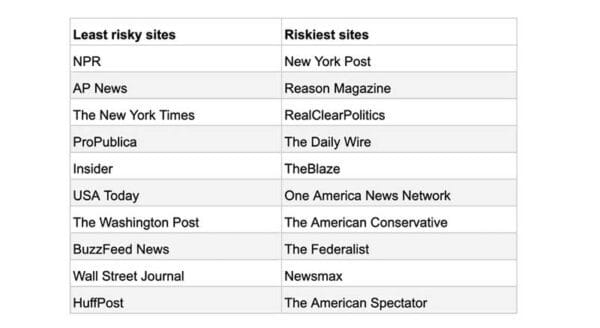
NewsGuard, a service that rates adherence to basic principles of good journalism, gives my employer, Reason magazine, its highest possible score. Yet the Global Disinformation Index (GDI), a British organization that aims to steer advertisers away from disreputable websites, claims Reason is one of the 10 “riskiest” online news sources in the United States.
The stark contrast between those two assessments illustrates the challenge of defining “disinformation,” an increasingly nebulous concept that invites subjective judgments driven by political allegiances and policy preferences. That problem is especially acute when the government demands that websites take steps to curtail “disinformation,” portraying it as a grave threat to public health, democracy, and national security.
The GDI, which receives financial support from the National Endowment for Democracy, purports to offer “neutral” estimates of the likelihood that a website will promote disinformation. Counterintuitively, its “risk” ratings do not require any actual examples of inaccurate reporting, let alone deliberate misrepresentations.
The Global Disinformation Index ratings are instead based on 16 “indicators” under two “pillars”: “content” and “operations.” The organization says Reason’s “high” risk rating was due to a lack of explicitly stated policies regarding “authorship attribution,” fact-checking, corrections, and moderation of reader comments.
The GDI emphasizes that its “content” judgments are based on a sample of articles that reviewers analyze without knowing the source or author, which it says helps “maintain nuance and neutrality.” But several of the “indicators” require judgments that are bound to be influenced by the reviewers’ personal opinions.
In assessing “article bias,” for example, reviewers are supposed to consider whether the writer uses “faulty logic” or “unfairly engages with different views on the story.” Reviewers also look for “negative targeting” of “individuals or institutions,” which is supposedly distinct from “criticism” based on “solid reasoning” and “strong evidence.”
The Global Disinformation Index says its ratings do not hinge on whether reviewers agree with the opinions that writers express. But it beggars belief to suppose that people who read articles that contradict their own views won’t be especially inclined to perceive “faulty logic,” insufficient attention to other perspectives, weak reasoning, and inadequate evidence.
It is therefore not surprising that all 10 of the “riskiest” sources identified by the GDI are conservative or libertarian,
….while nearly all of the “lowest-risk” sites, which include NPR, The New York Times, HuffPost and BuzzFeed News, lean left. Although the GDI insists that “the index does not assess partisanship or the specific political, religious or ideological orientation of the site,” it explicitly considers “the degree to which the site is likely to adhere to an ideological affiliation.”
The Global Disinformation Index combines dubious methods with a dodgy definition of “disinformation.”
You might think that disinformation, as distinct from misinformation, requires an intent to deceive. But the organization disavows that requirement because it “cannot be directly measured.”
The GDI’s definition of disinformation nevertheless describes it as “intentionally misleading.” The organization contradicts itself again when it says “all newsrooms are vulnerable to disinformation risks, ranging from everyday human error to more nefarious tactics” (emphasis added).
You might also think disinformation, at the very least, must be false. The GDI thinks that criterion is also too demanding because it is “extremely difficult to assess at scale” and because “a statement that is technically true can be presented out of context in a misleading and harmful way.”
In short, the folks at the GDI know disinformation when they see it, although they do not claim that “high-risk” websites actually promote it — only that they might. That attitude reflects a broader problem: Everyone agrees that disinformation is bad, but people disagree about what the category includes.
Given this confusion, the federal government’s efforts to squelch “disinformation,” which include pressure on social media platforms and subsidies for groups like the GDI, are especially chilling.
Even “intentionally misleading” speech is protected by the First Amendment, and a government that respects freedom of speech has no business deciding how to apply that slippery label.
About Jacob Sullum
Jacob Sullum is a senior editor at Reason magazine. Follow him on Twitter: @JacobSullum. During two decades in journalism, he has relentlessly skewered authoritarians of the left and the right, making the case for shrinking the realm of politics and expanding the realm of individual choice. Jacobs’ work appears here at AmmoLand News through a license with Creators Syndicate.







The ‘Peril’ always has and always will lie in who gets to decide what is considered ‘Disinformation’. That is why the Founders wrote the 1st Amendment as it is.
Disinformation is in the eye of the beholder. That’s why the left builds itself up to be the pinnacle of all thats good so they can be the gatekeepers of censorship. They are social and political scum not worthy of being dog dropping removal.
Very well said. I applaud your comment. You nailed it to the max.
“Even “intentionally misleading” speech is protected by the First Amendment, and a government that respects freedom of speech has no business deciding how to apply that slippery label.”
That kind of government is getting harder and harder to find.
Yes, one of the first things Obummer wanted to do was turn off Public Broadcasting and other TV and Radio shows like Rush Limbaugh. Obiden is pushing his agenda which is the leftist/Marxist/socialist agenda because they know from Hitler that is one of the ways to control the masses which is with the media’s propaganda.
Popular speech needs no protection.
The First Amendment protections are there to protect the speech that people do not want to have said.
i noticed that these all seem to be American outlets. do they do the same for media outlets in England and other countries around the world.
wonder how they would rate the ccp?
whomever who tells anyone else what is okay or bad is feeding you a load of bovine excrement with whip cream on top.
intelligent people can tell if they are being lied to, which most in the approved column have done to Americans for many years now.
this article was almost funny.
Who cares what a group from a country where they have basically given up all their god given rights of speech, self defense, firearms ownership, etc., etc. think.
I see what happened here with that list. They got all the names of the different outlets right and on the correct sides, they just messed up on the labels and got them reversed.
The news has become so political. I miss the Walter Cronkite and Paul Harvey days.
You can leave old Walter off that list, he was a raging lefty. He was the one who said we had lost the war in Vietnam after Actually, the North Vietnamese were ready to surrender because they had expended all of their ammo and troops. Our government let them have the time to rebuild their forces so that they could continue the fight. Once again our government sold us out. think Afghanistan lately.
Seems the fascists have their disinformation index bassackwards
The Limeys have been pounding sand for so long, they think they’re in the Sahara.
To boil it down… we’re good, you’re bad.